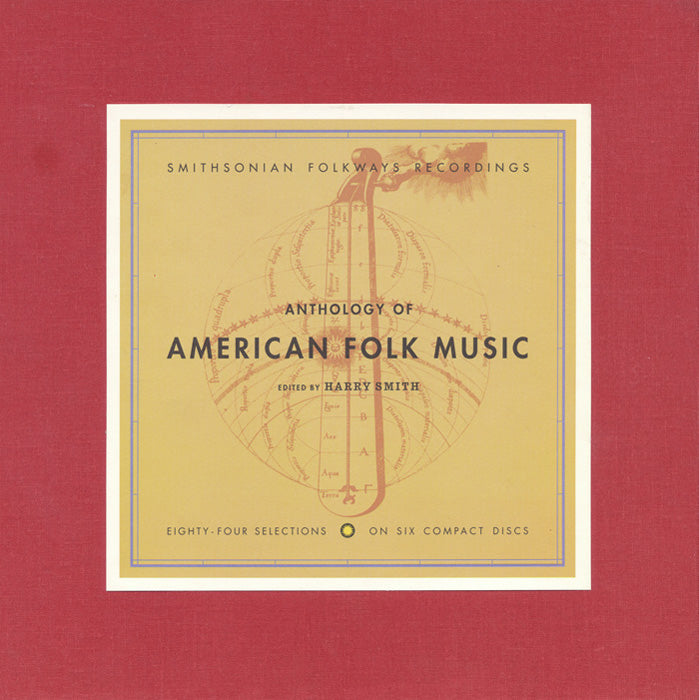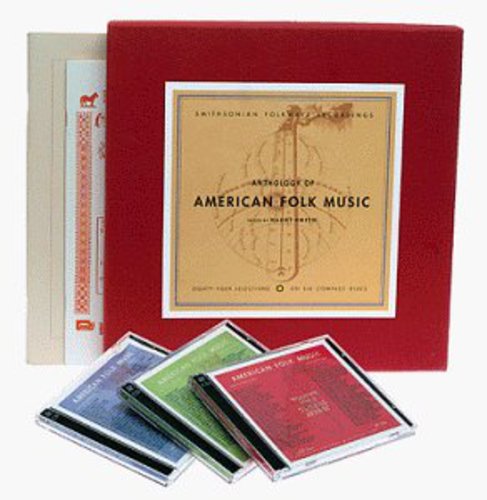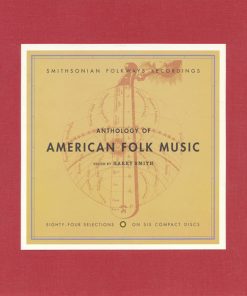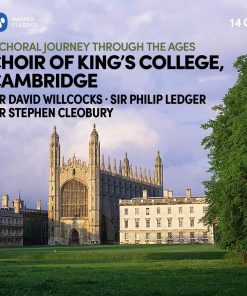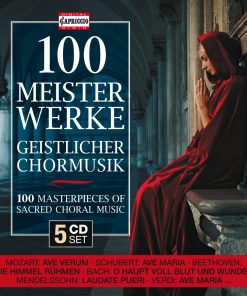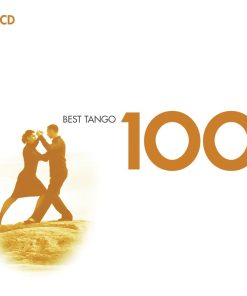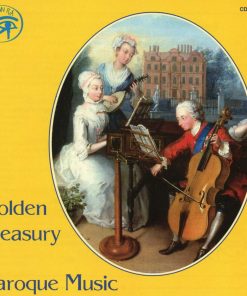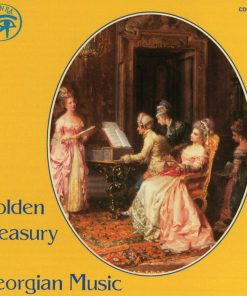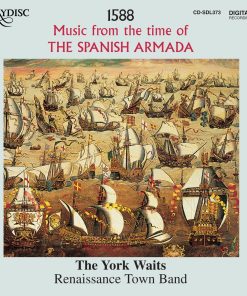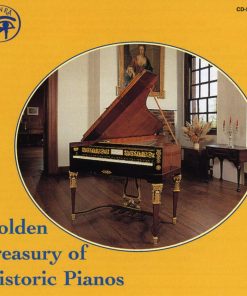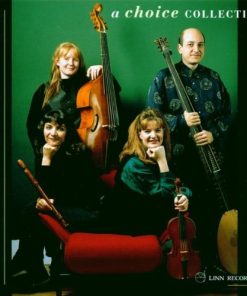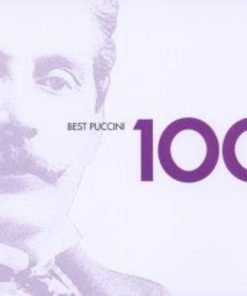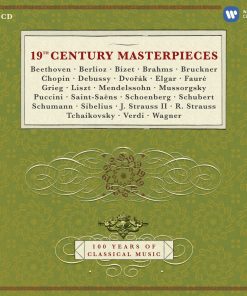ANTHOLOGY of AMERICAN FOLK MUSIC (6 CDs) SMITHSONIAN FOLKWAYS
$ 75,99 $ 37,99

The Anthology of American Folk Music, edited by Harry Smith (1923–1991), is one of the most influential releases in the history of recorded sound. Originally issued by Folkways Records in 1952, the Anthology brought virtually unknown parts of America’s musical landscape recorded in the late 1920s and early 1930s to the public’s attention. For more than half a century, the collection has profoundly influenced fans, ethnomusicologists, music historians, and cultural critics; it has inspired generations of popular musicians, including Bob Dylan, Joan Baez, Jerry Garcia, and countless others. Many of the songs included in the Anthology have now become classics, as has Harry Smith’s unique “scientific/aesthetic handbook” of song notes and drawings. Reissued by Smithsonian Folkways Recordings in 1997, this deluxe 6-CD collector’s boxed set contains a 96-page book featuring Harry Smith’s original liner notes and essays by Greil Marcus and other noted writers, musicians, and scholars.
“[The] Anthology was our bible…. We all knew every word of every song on it, including the ones we hated. They say that in the 19th-century British Parliament, when a member would begin to quote a classical author in Latin the entire House would rise in a body and finish the quote along with him. It was like that.” – Dave Van Ronk
“Had he never done anything with his life but this Anthology, Harry Smith would still have borne the mark of genius across his forehead. I’d match the Anthology up against any other single compendium of important information ever assembled. Dead Sea Scrolls? Nah. I’ll take the Anthology.” – John Fahey
“First hearing the Harry Smith Anthology of American FoIk Music is like discovering the secret script of so many familiar musical dramas. Many of these actually turn out to be cousins two or three times removed, some of whom were probably created in ignorance of these original riches. It also occurred to me that as we are listening at a greater distance in time to a man or woman singing of their fairly recent past of the 1880s, we are fortunate that someone collected these performances of such wildness, straightforward beauty, and humanity.” – Elvis Costello

Henry Lee – Dick Justice
Fatal Flower Garden – Nelston’s Hawaiians
House Carpenter – Clarence Ashley
Drunkard’s Special – Coley Jones
Old Lady and the Devil – Bill & Belle Reed
The Butcher’s Boy – Buell Kazee
The Wagoner’s Lad – Buell Kazee
King Kong Kitchie Kitchie Ki-Me-O – Chubby Parker
Old Shoes and Leggins – Uncle Eck Dunford
Willie Moore – Richard Burnett and Leonard Rutherford
A Lazy Farmer Boy – Buster Carter and Preston Young
Peg and Awl – Carolina Tar Heels
Ommie Wise – G.B. Grayson
My Name Is John Johanna – Kelly Harrell
Bandit Cole Younger – Edward L. Crain
Charles Giteau – Kelly Harrel
John Hardy Was a Desperate Little Man – Carter Family
Gonna Die with My Hammer in My Hand – Williamson Brothers and Curry
Stackalee – Frank Hutchison
White House Blues – Charlie Poole and the North Carolina Ramblers
Frankie – Mississippi John Hurt
When That Great Ship Went Down – William and Versey Smith
Engine 143 – Carter Family
Kassie Jones – Furry Lewis
Down on Penny’s Farm – Bently Boys
Mississippi Boweavil Blues – Masked Marvel
Got the Farm Land Blues – Carolina Tar Heels
Sail Away Lady – Uncle Bunt Stephens
The Wild Wagoner – Jilson Setters
Wake Up Jacob – Prince Albert Hunt’s Texas Ramblers
La Danseuse – Delma Lachney and Blind Uncle Gaspard
Georgia Stomp – Andrew and Jim Baxter
Brilliancy Medley – Eck Robertson
Indian War Whoop – Hoyt Ming & His Pep-Steppers
Old Country Stomp – Henry Thomas
Old Dog Blue – Jim Jackson
Saut Crapaud – Columbus Fruge
Acadian One-Step – Joseph Falcon
Home Sweet Home – Breaux Freres
Newport Blues – Cincinnati Jug Band
Moonshiner’s Dance (Part One) – Frank Cloutier and the Victoria Cafe Orchestra
You Must Be Born Again – Rev. J.M. Gates
Oh Death Where Is Thy Sting – Rev. J.M. Gates
Rocky Road – Alabama Sacred Harp Singers
Present Joys – Alabama Sacred Harp Singers
This Song of Love – Middle Georgia Singing Conv. No. 1
Judgement – Sister Mary Nelson
He Got Better Things for You – Memphis Sanctified Singers
Since I Laid My Burden Down – Elders McIntorsh & Edwards’ Sanctified Singers
John the Baptist – Rev. Moses Mason
Dry Bones – Bascom Lamar Lunsford
John the Revelator – Blind Willie Johnson
Little Moses – Carter Family
Shine on Me – Ernest Phipps & Holiness Singers
Fifty Miles of Elbow Room – Rev. F.W. McGee
In the Battlefield for My Lord – Rev. D.C. Rice and Congregation
The Coo Coo Bird – Clarence Ashley
East Virginia – Buell Kazee
Minglewood Blues – Cannon’s Jug Stompers
I Woke Up One Morning in May – Didier Hebert
James Alley Blues – Richard ‘Rabbit’ Brown
Sugar Baby – Dock Boggs
I Wish I Was a Mole in the Ground – Bascom Lamar Lunsford
Mountaineer’s Courtship – Ernest and Hattie Stoneman
The Spanish Merchant’s Daughter – Stoneman Family
Bob Lee Junior Blues – Memphis Jug Band
Single Girl, Married Girl – Carter Family
Le Vieux Soulard Et Sa Femme – Cleoma Breaux & Joseph Falcon
Rabbit Foot Blues – Blind Lemon Jefferson
Expressman Blues – Sleepy John Estes & Yank Rachell
Poor Boy Blues – Ramblin’ Thomas
Feather Bed – Cannon’s Jug Stompers
Country Blues – Dock Boggs
99 Year Blues – Julius Daniels
Prison Cell Blues – Blind Lemon Jefferson
See That My Grave Is Kept Clean – Blind Lemon Jefferson
C’est Si Triste Sans Lui – Cleoma and Ophy Breaux and Joseph Falcon
Way Down the Old Plank Road – Uncle Dave Macon
Buddy Won’t You Roll Down the Line – Uncle Dave Macon
Spike Driver Blues – Mississippi John Hurt
K.C. Moan – Memphis Jug Band
Train on the Island – J.P. Nestor
The Lone Star Trail – Ken Maynard
Fishing Blues – Henry Thomas
Fast Shipping and Professional Packing
Due to our longstanding partnership with UPS FedEx DHL and other leading international carriers, we are able to provide a range of shipping options. Our warehouse staff are highly trained to pack your goods exactly according to the specifications that we supply. Your goods will undergo a thorough examination and will be safely packaged prior to being sent out. Everyday we deliver hundreds of packages to our customers from all over the world. This is an indication of our dedication to being the largest online retailer worldwide. Warehouses and distribution centers can be located in Europe as well as the USA.
Orders with more than 1 item are assigned processing periods for each item.
Before shipment, all ordered products will be thoroughly inspected. Today, most orders will be shipped within 48 hours. The estimated delivery time is between 3-7 days.
Returns
The stock is constantly changing. It's not entirely managed by us since we are involved with multiple parties such as the factory and our storage. The actual stock can fluctuate at any time. Please understand it may happen that your order will be out of stock when the order is placed.
Our policy is valid for 30 days. If you haven't received your product within 30 days, we're not able to issue either a return or exchange.
You are able to return a product if it is unused and in the same condition when you received it. It must also still remain in the original packaging.
Related products
MUSIC CDS
MUSIC CDS
MUSIC CDS
MUSIC CDS
MUSIC CDS
MUSIC CDS
